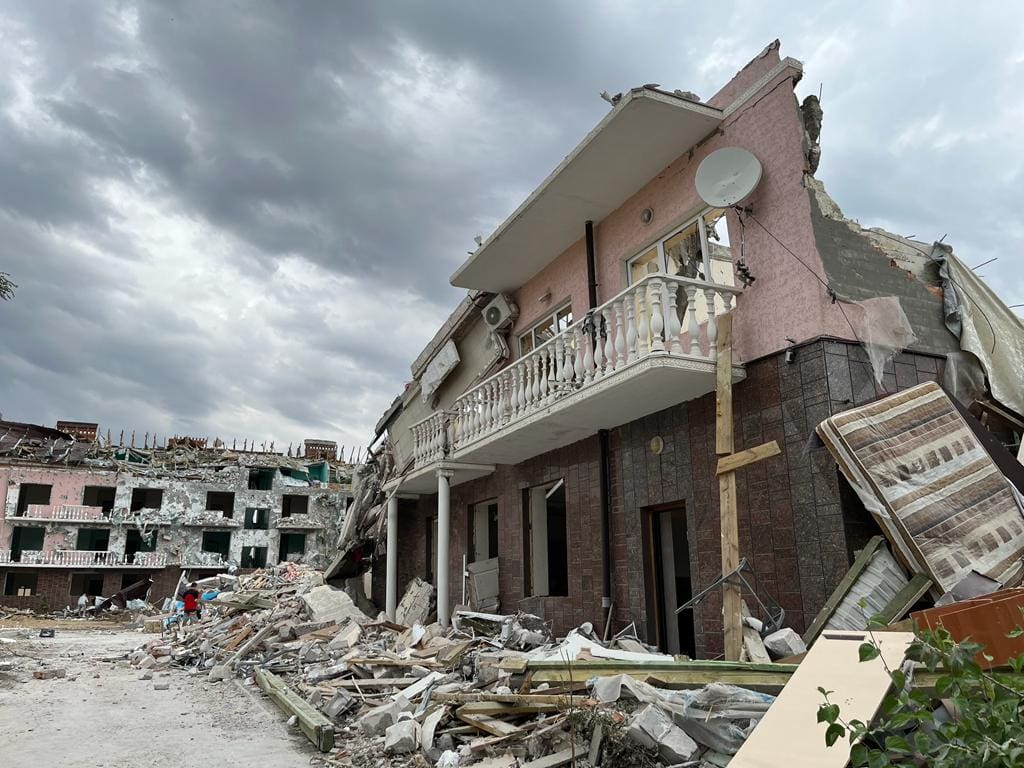The strikes, apparently using anti-ship missiles, hit the town in the Odesa region shortly before 1am on July 1, injuring at least 35 people. Five people remain in serious condition in intensive care, meaning the total death toll may rise.
“These powerful weapons were designed to destroy warships, and firing them into residential areas is extremely reckless,” said Donatella Rovera, Amnesty International’s Senior Crisis Response Adviser.
“This attack is yet another example of the Russian military’s utter disregard for civilians in Ukraine as they continue to cause needless death and destruction. All those responsible for such war crimes must face justice for their actions.”
Amnesty International visited the strike locations in Serhiivka and found no evidence of the presence of Ukrainian soldiers, weapons, or other valid military targets nearby. Satellite imagery reviewed by Amnesty International also did not indicate any military activity in the area prior to the attack.
Local government officials told Amnesty International that the weapons used in the attack were two Kh-22 guided missiles. With an estimated warhead of more than 900kg and a targeting system designed to hit ships rather than land objects, the missile is potentially extremely inaccurate, and therefore completely inappropriate for use in a populated area.
Amnesty International’s Crisis Response weapons expert found ordnance fragments consistent with a large guided missile at the scene of the strike on the hotel. Notably, the fragments contained old-style rivets, consistent with a 50-year-old weapon such as a Kh-22.
A core principle of international humanitarian law (the laws of war) is that parties to an armed conflict must at all times distinguish between civilians and civilian objects, and members of the military and military objectives. Military objectives can be targeted, but it is unlawful to target civilians or civilian objects. Prior to any attack, members of the military are required to take steps to ensure that they are reasonably certain they are not targeting civilians and civilian objects.
To date, there have been numerous examples of Russian forces routinely launching unlawful attacks in Ukraine which have killed and injured civilians, some of which may have been deliberate attacks on civilians or civilian objects.
Resort hotel strike
Just after midnight on July 1, Russian forces launched at least two missiles towards the Black Sea resort of Serhiivka, around 45 miles southwest of the city of Odesa. The first missile hit the Godji Hotel, and killed six civilians. Just minutes later, a second missile hit the hardware store at the front of a residential nine-storey building at 23 Budzhaska Street, and killed 15 civilians.
Amongst those killed at the Godji Hotel were Nadiya Rudnitskaya, the hotel manager, and her 12-year-old son Dmytro Rudnitsky. Olha Ilyashevych, 30, and her mother Maria, who had both fled fighting from Slovyansk in the Donbas region, were also killed.
The fatalities also included Oleksander Shishkov, 41, a well-known football coach who lived in Odesa but who had been staying at the hotel following a children’s football match the day before between the local team and the team from the nearby town of Bilhorod-Dnistrovsky.
Residential block strike
Amongst those killed in the strike on Budzhaska Street were Volodymyr Chulak, a 68-year-old physical education teacher, his wife Tetiana, a 64-year-old chef, and their son Mykhaylo, 35, who lived in Odesa and was visiting his parents.
Tetiana Chulak’s sister Valentyna told Amnesty International: “I heard the explosions and ran to the street… I ran there [number 23] and into the building, and found Tetiana in her bed, dead, covered in smashed-up furniture and debris, and her husband Volodymyr was dead in the kitchen. Their son Mykhaylo had been standing on the terrace, and was directly hit by the missile; he was in shreds.”
Also killed were Halyna Rumashuk, a 50-year-old receptionist, and her husband Serhii, a 48-year-old builder. They had initially survived the strike and managed to escape the building, but the couple then returned to look for some of their belongings, when a wall collapsed and killed them both.
Roman, 36, a resident of the fourth floor of the building, told Amnesty International that he and his mother only survived because at the time of the strike they were behind a poured-concrete wall in their kitchen, bathing their puppy who had undergone surgery. The rest of their apartment was obliterated in the blast. Roman attempted to save his next-door neighbour, Proskovia Pavlenko, 63. She was mortally wounded in the blast, and died as he carried her from the building.
Natalia Yankovska and her partner Maksym Nedomov both died from serious injuries caused by the blast. Natalia’s two young sons from a previous marriage, aged 10 and 14, both remain in hospital, with one in critical condition.
Other victims killed in the strike on the residential block include Oleksander Sribny (47), Tetiana Nesterenko (64), and Vira Maksymenko (71).
“The Russian military’s relentless bombardment of residential areas full of civilians, killing people as they sleep, shocks the conscience,” said Donatella Rovera.
“How many more civilians must die before there is justice and accountability for these crimes? The Russian forces responsible for these ongoing serious violations of international humanitarian law must be held accountable for their actions, and victims and their families must receive full reparations.”
Amnesty International’s ongoing documentation of violations of human rights and international humanitarian law committed during the war in Ukraine is available here.
Contact: Gabby Arias, [email protected]

